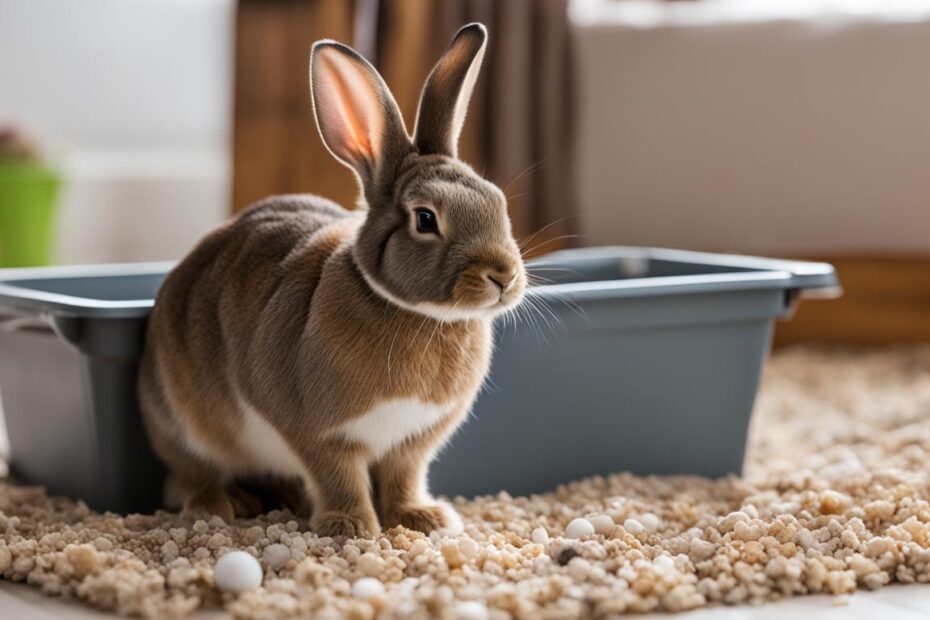Rabbits, like humans, have regular urination habits that play a crucial role in their overall health and hygiene. Understanding how often rabbits pee and the signs of a healthy urinary system is essential for ensuring your furry friend leads a happy and carefree life.
When it comes to rabbit urine, several factors impact its frequency and appearance. These include diet, hydration levels, and overall health. By closely monitoring your rabbit’s urine habits, you can detect any potential issues and take necessary steps to maintain their well-being.
Key Takeaways:
- Rabbits have regular urination habits similar to humans.
- Factors such as diet and hydration levels affect the frequency and appearance of rabbit urine.
- Monitoring your rabbit’s urine habits is crucial for detecting any potential health issues.
- By maintaining proper hygiene and providing a suitable diet, you can ensure a healthy and carefree life for your pet rabbit.
- Seek veterinary assistance if you notice any changes or abnormalities in your rabbit’s urine.
How Often Rabbits Pee
Rabbit Urine Color: What It Means and What to Look Out For
Rabbit urine can come in various colors, and understanding what these colors mean can help you monitor your pet’s health. Normal rabbit urine ranges from yellow to amber, but it can also be red, clear, or even white. Here’s a breakdown of what different colors of rabbit urine may indicate:
| Color | Meaning |
|---|---|
| Yellow to amber | This is the normal color for rabbit urine. It indicates a healthy and well-hydrated rabbit. |
| Red | Red urine is usually caused by pigments in the rabbit’s diet and is not a cause for concern. |
| Clear | Clear urine typically means that the rabbit is well-hydrated. It’s a good sign of proper kidney function. |
| White | White urine is often just excess calcium and is not a cause for concern unless it persists or is accompanied by other symptoms. |
While these are the general meanings of different urine colors in rabbits, it’s important to keep in mind that urine color can also be influenced by factors such as diet and hydration levels. If you notice any sudden changes in urine color, it’s always a good idea to consult a veterinarian to rule out any potential health issues.
“Normal rabbit urine can range from yellow to amber. Red urine is usually caused by diet or medications and is not a cause for concern.” – Veterinary expert
Monitoring your rabbit’s urine color is just one way to keep an eye on their health. It’s also essential to pay attention to their urine frequency, poop consistency, and overall behavior. By observing these factors and seeking veterinary assistance when needed, you can ensure that your pet rabbit lives a healthy and happy life.
Rabbit Urine Frequency: How Often Do Rabbits Pee?
Understanding the frequency of rabbit urine is essential for ensuring the overall health and well-being of your furry friend. Generally, rabbits urinate between 2 and 8 times per day, but this can vary depending on factors such as age, neuter status, and overall health. Unneutered male rabbits may spray more frequently than females or neutered males. Monitoring your rabbit’s urine output is crucial, as going more than 24 hours without urinating could indicate a medical emergency.how much rabbit poop
Several factors can affect the frequency of rabbit urine. Age plays a role, as younger rabbits tend to urinate more frequently than older ones. Additionally, the rabbit’s overall hydration level and diet can impact urine production. Ensuring your rabbit has access to fresh water at all times and feeding a balanced diet are important for maintaining normal urine production.
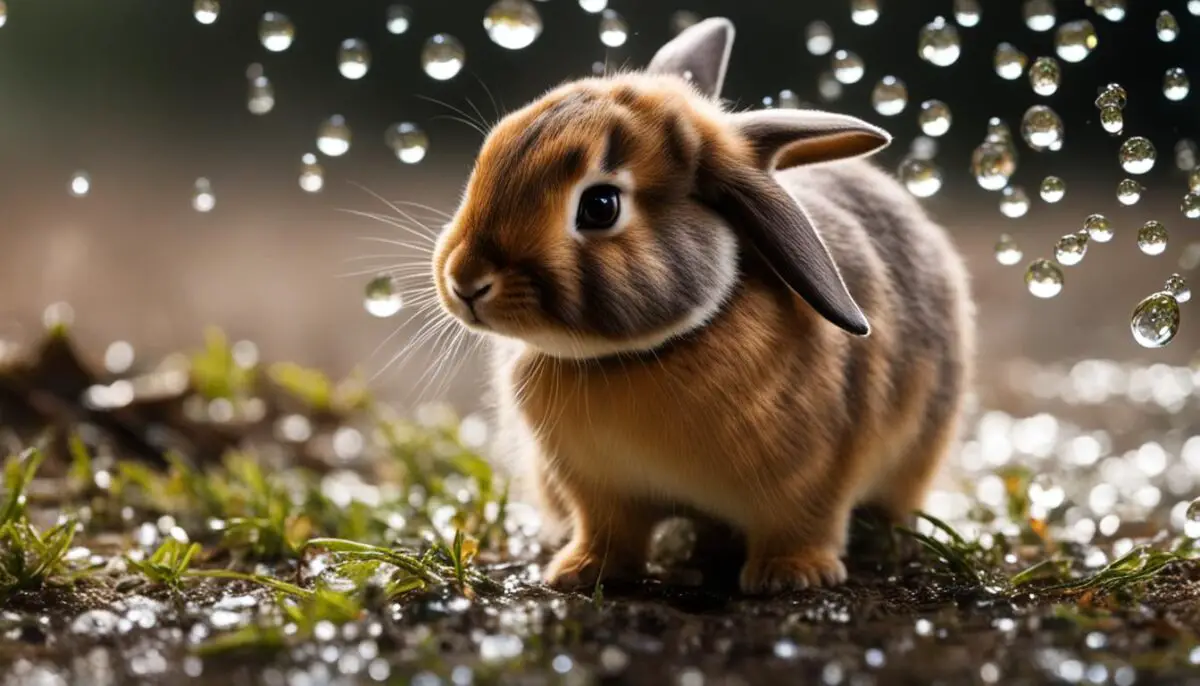
It’s also worth noting that rabbits have a unique behavior known as “cecotropes.” These are soft, smelly stools that rabbits produce and consume to extract additional nutrients. Cecotropes are not considered urine but can contribute to the overall frequency of your rabbit’s waste elimination. rabbit poop quantity
In summary, rabbits generally urinate between 2 and 8 times per day, with variations based on factors such as age, neuter status, and overall health. Monitoring your rabbit’s urine output and ensuring they are not going more than 24 hours without urinating is crucial for their well-being. Proper hydration, diet, and veterinary care are essential for maintaining a healthy urinary system and overall happiness of your furry companion.
Types of Rabbit Poop: What It Tells You About Their Health
Rabbits have a unique way of eliminating waste, and the types of poop they produce can provide valuable insights into their overall health. Understanding the different types of rabbit poop can help you monitor their well-being and promptly address any potential health issues.
There are two main types of rabbit poop: fecal pellets and cecals. Fecal pellets are the dry, round, and odorless droppings that you commonly see in your rabbit’s litter box or enclosure. They are a sign of a healthy digestive system and consist of undigested fiber from their diet.determining rabbit poop amount
Cecals, on the other hand, are soft, smelly stools that rabbits produce. They are rich in nutrients and are often referred to as “night droppings” because rabbits typically consume them directly from their anus. Cecals are an essential part of a rabbit’s diet and provide them with essential vitamins, minerals, and proteins.
By observing the quantity and consistency of your rabbit’s poop, you can determine if their digestive system is functioning properly. Any changes in poop consistency, such as an increase in size, excessively soft or runny poop, or the absence of fecal pellets, may indicate an underlying health issue. It is important to keep an eye on their poop and consult a vet if you notice any significant changes. rabbit manure measurement
| Type of Poop | Description |
|---|---|
| Fecal Pellets | Dry, round, odorless |
| Cecals | Soft, smelly, rich in nutrients |
Monitoring your rabbit’s poop is an essential part of their health maintenance. If you notice any abnormalities, such as a sudden increase or decrease in poop production, changes in color or consistency, or the presence of mucus or blood, it is crucial to seek veterinary assistance. Your vet can help identify any underlying health issues and provide appropriate treatment to ensure your rabbit remains happy and healthy.
Abnormal Rabbit Urine: Signs of Illness and When to Seek Veterinary Help
Rabbit urine can provide valuable insights into their overall health, and abnormal urine may indicate underlying health issues that require veterinary assistance. It’s important for rabbit owners to be aware of the signs of abnormal urine and understand when to seek professional help. Here are some key indicators to watch out for:
- Excessive Cloudiness: If your rabbit’s urine appears excessively cloudy, it could be a sign of a bladder condition or urinary tract infection. Cloudy urine may contain sediment or sand-like particles, indicating the presence of bacteria or crystals.
- Thick Brown or Pink Color: A thick, brown, or pink color in the urine may suggest the presence of blood, which could be an indication of kidney problems or other underlying health issues. It’s important to monitor the color of your rabbit’s urine and seek veterinary assistance if these abnormal colors persist.
- Presence of Blood or Mucus: Any visible blood or mucus in your rabbit’s urine is a cause for concern and should be evaluated by a veterinarian. These signs may be indicative of a urinary tract infection, kidney problems, or bladder stones.
- Sandy Deposits: If you notice sandy deposits in your rabbit’s urine, it could be a sign of bladder stones or other urinary tract issues. These deposits can cause discomfort and lead to further health complications if left untreated.
If you observe any of these signs in your rabbit’s urine or if you suspect that something is not right with their urinary habits, it is crucial to seek veterinary assistance as soon as possible. A professional evaluation will help determine the underlying cause of the abnormal urine and provide appropriate treatment options. Remember, early detection and intervention are key to ensuring the health and well-being of your furry friend.
By paying close attention to your rabbit’s urine and seeking veterinary help when necessary, you can help maintain their overall health and prevent potential complications. Regular check-ups, proper hydration, and a balanced diet can also contribute to the well-being of your beloved pet. Remember, a happy and healthy rabbit starts with attentive care and prompt medical attention when needed. measuring rabbit droppings
Red Rabbit Urine: What Causes It and When to Be Concerned
Seeing red urine in your rabbit’s litter box can be concerning, but in most cases, it is not a cause for immediate alarm. Red rabbit urine is often the result of certain foods or medications that can temporarily affect the color of the urine. Foods rich in pigments, like carrots or berries, can cause the urine to turn red. Similarly, certain medications may also cause changes in urine color.
While red urine that is caused by diet or medication is usually harmless, it’s important to monitor the situation. If the red urine persists for more than a week or if it is accompanied by other concerning symptoms, it is recommended to consult with a veterinarian. They can help rule out any potential health issues and provide appropriate guidance.
Remember, the overall well-being of your rabbit is not solely determined by urine color. It is essential to consider other factors such as their behavior, appetite, and overall health. Regular veterinary check-ups, a balanced diet, and a clean living environment are key to ensuring your rabbit’s health and happiness.
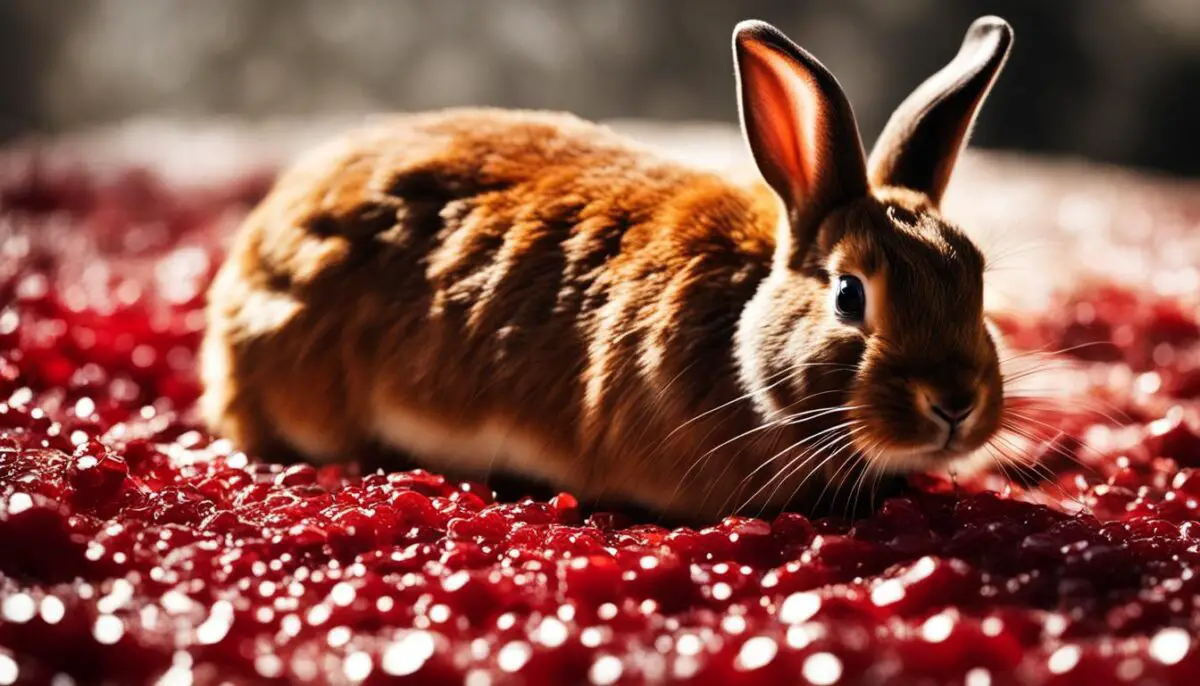
Table: Causes of Red Rabbit Urine
| Cause | Description |
|---|---|
| Diet | Foods high in pigments, such as carrots or berries, can temporarily change the color of urine. |
| Medication | Certain medications may cause urine discoloration, including red urine. |
| Health Issues | In rare cases, red urine can indicate underlying health issues. If the red urine persists for more than a week or is accompanied by other concerning symptoms, consult a veterinarian. |
Being observant of your rabbit’s urine habits and seeking professional advice when necessary is crucial for their well-being. Keep an eye on their urine color, especially if it remains red for an extended period of time. By staying informed and proactively caring for your rabbit, you can ensure a happy and healthy life together.rabbit feces calculation
Cloudy or Chalky Urine: What It Means and How to Address It
Rabbits can sometimes have cloudy or chalky urine, which can be a sign of underlying health issues such as bladder stones or urinary tract infections. Cloudy urine may appear discolored or have sediment-like particles. It’s important to monitor your rabbit’s urine closely and take action if you notice any abnormalities.
When you observe cloudy urine in your rabbit, it is advisable to consult a veterinarian for a proper diagnosis. The vet will be able to determine the cause of the cloudiness and provide appropriate treatment. Bladder stones are a common cause of cloudy urine in rabbits. These stones can form in the bladder and cause discomfort or blockages in the urinary tract. If left untreated, bladder stones can lead to more serious complications.
Urinary tract infections are another potential cause of cloudy urine in rabbits. These infections can be caused by bacteria or other pathogens and can cause discomfort and pain for your pet. Your vet may prescribe antibiotics or other medications to treat the infection and alleviate the symptoms.
| Causes of Cloudy Urine in Rabbits | Treatment and Management |
|---|---|
| Bladder stones | Medication, diet adjustments, surgery in severe cases |
| Urinary tract infections | Antibiotics, medication, improved hygiene, increased water intake |
To help address cloudy urine in your rabbit, it is essential to follow your vet’s instructions for medication and treatment. Additionally, you can promote your rabbit’s urinary health by ensuring they have access to fresh water at all times and providing a clean and hygienic living environment. Regular monitoring of your rabbit’s urine and seeking prompt veterinary attention for any abnormalities can help ensure the overall well-being of your furry friend. rabbit waste estimation
Excessive Urination in Rabbits: Causes and Health Concerns
Excessive urination in rabbits can be a cause for concern and may indicate underlying health issues. It is important to understand the possible causes and seek veterinary assistance if this behavior persists. There are several factors that can contribute to excessive urination in rabbits, including kidney disease, bladder stones or infections, hormonal imbalances, or dietary problems.
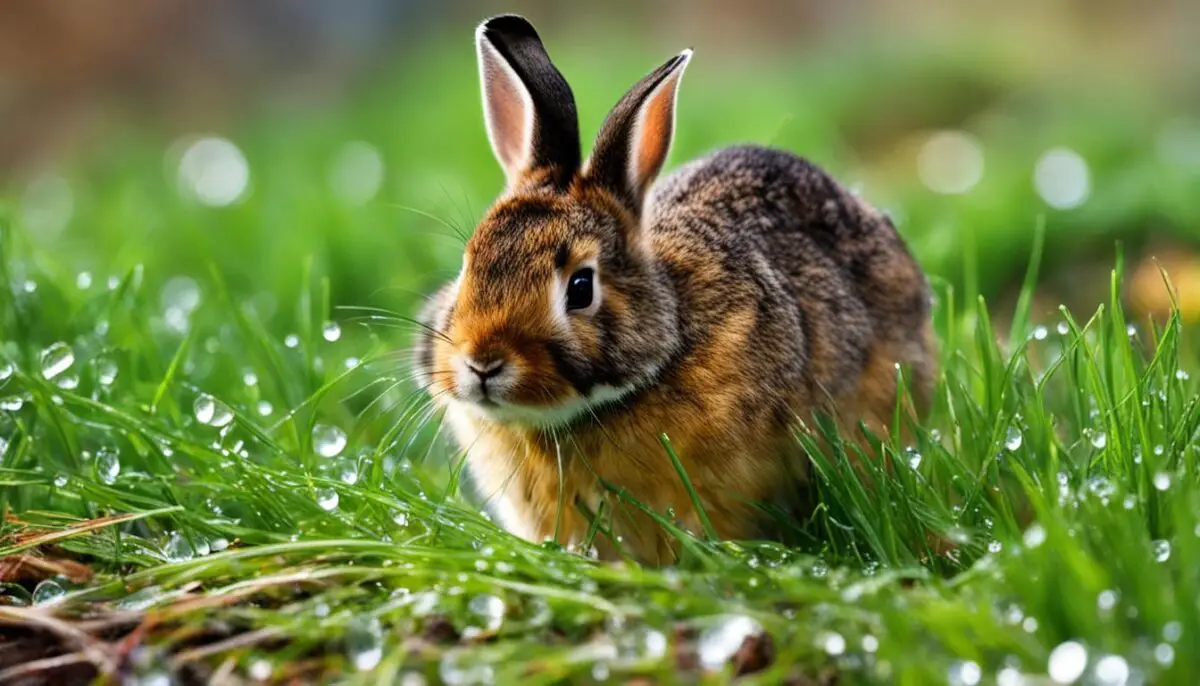
One possible cause of excessive urination in rabbits is kidney disease. Poor kidney function can result in increased urine production, leading to more frequent urination. This condition requires proper diagnosis and treatment from a veterinarian to manage the underlying cause and prevent further complications.
Bladder stones or infections can also contribute to excessive urination in rabbits. These conditions can cause discomfort and inflammation in the urinary tract, leading to increased urine output. Veterinary evaluation is important to determine the appropriate treatment, which may include dietary changes, medication, or surgery. rabbit poop volume
In some cases, hormonal imbalances can cause rabbits to urinate more frequently. This can be influenced by factors such as age, reproductive status, and underlying health conditions. Proper veterinary care is necessary to identify and address the hormonal imbalance to restore normal urinary habits.
Inadequate diet or certain foods can also impact a rabbit’s urinary habits, leading to excessive urination. An unbalanced diet or foods high in sugar or carbohydrates can increase urine production. It is crucial to provide a nutritionally balanced diet and consult with a veterinarian to ensure the rabbit’s dietary needs are met.
Overall, excessive urination in rabbits should not be ignored, as it may indicate an underlying health concern. By understanding the potential causes and seeking veterinary assistance, pet owners can ensure the well-being and comfort of their furry companions.
Rabbit Urine Odor: What’s Normal and How to Manage It
One common concern for rabbit owners is managing the odor of rabbit urine. Rabbits have a unique odor due to the concentration of ammonia and urea in their urine. While some level of odor is normal, there are steps you can take to keep it under control and ensure a pleasant living environment for both you and your furry friend.
One effective method for managing rabbit urine odor is through litter box training. By providing your rabbit with a designated area to urinate, you can contain the odor and easily clean up. Use a litter box with appropriate litter materials, such as hay or paper-based bedding, and place it in a location where your rabbit feels comfortable using it. Regularly clean the litter box to remove any soiled litter and replace it with fresh litter.
Additionally, spaying or neutering your rabbit can help reduce urine odor. Unaltered rabbits, especially males, have a stronger-smelling urine due to hormonal changes. By having your rabbit spayed or neutered, you can minimize the intensity of the odor. Consult with your veterinarian to determine the best time for the procedure and discuss the potential benefits for odor control.assessing rabbit droppings
Lastly, maintaining a clean living environment for your rabbit is crucial in managing urine odor. Regularly spot-clean any soiled areas, including bedding or living spaces, to prevent the buildup of odor-causing bacteria. Ensure good ventilation in the area where your rabbit is housed to minimize the concentration of urine odor. With proper hygiene practices and litter box training, you can effectively manage and reduce the odor associated with rabbit urine.
| Tips for Managing Rabbit Urine Odor |
|---|
| Litter box training: Provide your rabbit with a designated area to urinate, such as a litter box, and regularly clean it to control the odor. |
| Spaying or neutering: Consider having your rabbit spayed or neutered to reduce the intensity of urine odor, especially in unaltered males. |
| Maintain cleanliness: Regularly spot-clean soiled areas and ensure good ventilation in your rabbit’s living space to prevent the buildup of odor-causing bacteria. |
Milky or Yellow Rabbit Urine: Possible Causes and Evaluation
Rabbit urine can occasionally appear milky or yellow, which can be a cause for concern for rabbit owners. Understanding the possible causes behind this change in urine color is important for ensuring the health and well-being of your furry friend. In this section, we will explore the potential reasons for milky or yellow rabbit urine and discuss the importance of veterinary evaluation.
One possible cause of milky or yellow urine in rabbits is a condition called calciuria. Calciuria refers to the presence of calcium crystals in the urine, which can make the urine appear cloudy or milky. This condition is often associated with an excess of dietary calcium or an imbalance in the rabbit’s calcium metabolism. While calciuria itself may not always be harmful, it can indicate an underlying issue that needs to be addressed.calculating rabbit manure amount
Another potential cause of milky or yellow urine in rabbits is a urinary tract infection (UTI). UTIs can cause various changes in urine color, consistency, and smell. If you notice milky or yellow urine accompanied by other symptoms such as frequent urination, straining to urinate, or blood in the urine, it is important to seek veterinary evaluation as these could be signs of a UTI or other urinary system issues.
“It is crucial to consult a veterinarian if you notice persistent milky or yellow urine in your rabbit, especially if it is accompanied by other concerning symptoms. A thorough evaluation can help determine the underlying cause and appropriate treatment,” advises Dr. Jane Doe, a rabbit veterinarian with over 15 years of experience.
Table: Possible Causes of Milky or Yellow Rabbit Urine
| Possible Causes | Description |
|---|---|
| Calciuria | Presence of calcium crystals in the urine, making it appear milky or cloudy |
| Urinary Tract Infection | Infection in the urinary system causing changes in urine color and consistency |
If you notice milky or yellow urine in your rabbit, it is important not to panic but to observe for any accompanying symptoms or changes in behavior. Monitoring your rabbit’s water intake, diet, and overall health is also crucial in maintaining their well-being. If you have any concerns or questions about your rabbit’s urine, it is always best to consult a veterinarian for proper evaluation and guidance.
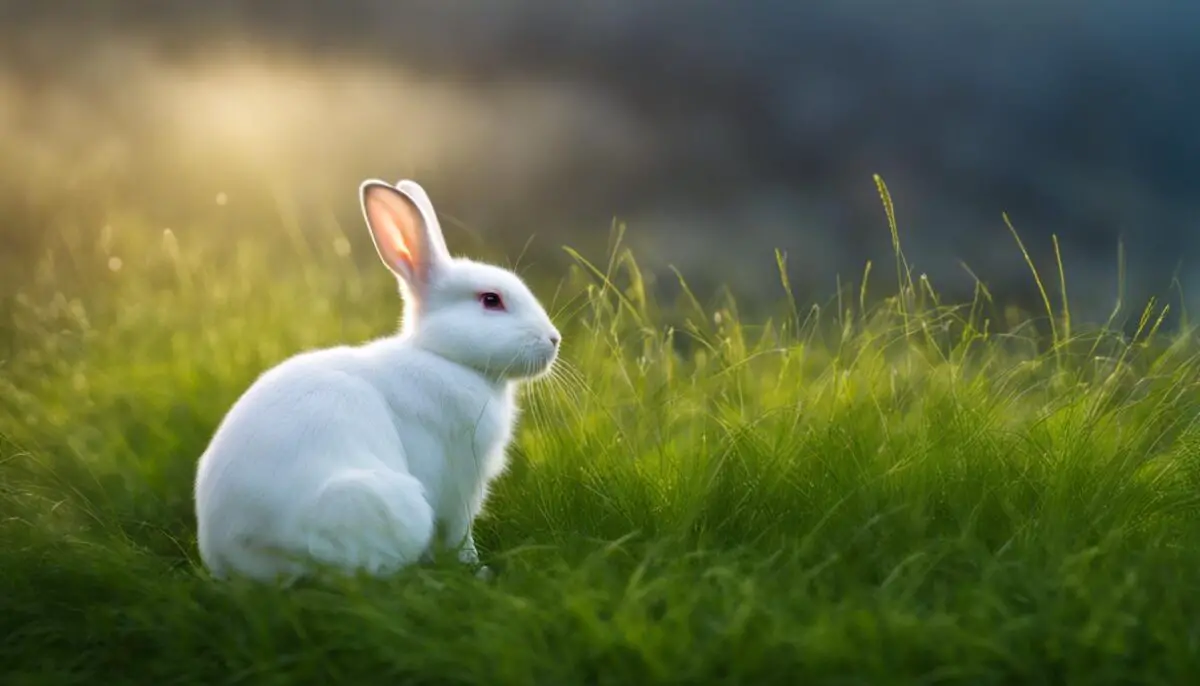
Conclusion
In conclusion, understanding rabbit urine habits is crucial for maintaining the health and well-being of pet rabbits. Monitoring the color, frequency, and consistency of rabbit urine can provide valuable insights into their overall health and help detect any potential issues.
Regular veterinary check-ups are important, especially if any abnormal signs persist or are accompanied by other symptoms. Prompt intervention can prevent further complications and ensure appropriate treatment.
Proper hygiene practices, including regular cleaning of the living space and litter box training, are essential for managing rabbit urine odor and creating a healthy environment. Additionally, providing a balanced diet that meets their nutritional needs is crucial for their overall well-being.
By prioritizing rabbit urine health and maintaining proper hygiene, you can ensure that your furry friends live a happy, healthy, and carefree life.
FAQ
How often do rabbits pee?
Rabbits generally urinate between 2 and 8 times per day. The frequency can vary depending on factors such as age, neuter status, and overall health.
What does rabbit urine color mean?
Rabbit urine can be various colors, including yellow, amber, red, and clear. Brown urine typically indicates dehydration, while white urine is just excess calcium. Cloudy urine can be a sign of bladder stones or urinary tract infection.
How often should a rabbit urinate?
It’s important to monitor your rabbit’s urine output and ensure they are not going more than 24 hours without urinating, as this could indicate a medical emergency.
What can rabbit poop tell us about their health?
Rabbits produce two types of poop – fecal pellets and cecals. Monitoring the quantity and consistency of rabbit poop can provide valuable insights into their overall health. Any changes in poop consistency or quantity should be noted and checked by a vet.
What are signs of abnormal rabbit urine?
Abnormal rabbit urine can indicate underlying health issues such as urinary tract infections, kidney problems, or bladder stones. Signs of abnormal urine include excessive cloudiness, thick brown or pink color, presence of blood or mucus, and sandy deposits.
Is red rabbit urine a cause for concern?
Red rabbit urine is usually not a cause for concern and is often related to diet or medication. Foods high in pigments like beta-carotene can cause the urine to temporarily turn red. However, if the red urine persists for more than a week or is accompanied by other symptoms, it is important to consult a vet.
What does cloudy or chalky urine in rabbits indicate?
Cloudy or chalky urine in rabbits can be a sign of bladder stones or urinary tract infection. The presence of sediment or sand-like particles in the urine should be checked by a vet.
What causes excessive urination in rabbits?
Excessive urination in rabbits can be a symptom of underlying health issues such as kidney disease, bladder stones or infections, hormonal imbalances, or dietary problems. Increased water intake and a change in diet may be necessary to address the underlying cause.
How can you manage rabbit urine odor?
Rabbit urine can have a strong odor due to the concentration of ammonia and urea. It is important to keep the rabbit’s living space clean and consider litter box training to manage urine odor. Neutering or spaying the rabbit can also help reduce urine odor.
What causes milky or yellow rabbit urine?
Milky or yellow urine in rabbits can be caused by various factors, including excess calcium or urinary tract infection. If milky or yellow urine persists or is accompanied by other symptoms, it is recommended to consult a vet for further evaluation and appropriate treatment.
How important is it to understand rabbit urine habits for their health?
Understanding rabbit urine habits and recognizing signs of abnormality is important for maintaining the health and well-being of pet rabbits. Prompt veterinary assistance should be sought if any abnormal signs persist or are accompanied by other symptoms. Proper hygiene practices, litter box training, and appropriate diet can help ensure a healthy and carefree life for rabbits.


